|
Annual National Farmers’ Week in Vavuniya:
Focus on Northern farmers
By L.S Wdaarachchi
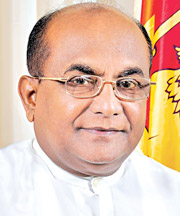 |
|
Agriculture Minister,
Mahinda Yapa Abeywardena |
The paddy production in 2010 was 2.92 MT
which exceeded the country’s annual requirement. The production of
essential food items has sharply increased during the past few years due
to the agriculture-friendly policies of the present government, said
Agriculture Ministry Secretary K.E. Karunatileke. In an interview with
Sunday Observer on the “6th National Farmers Week” to be held in
Vavuniya from August 1 to 5.
Excerpts of the interview:
Q: Can you explain the reason to select Vavuniya as the venue
for this year’s event?
|
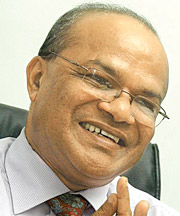
Agriculture Ministry
Secretary K.E. Karunatileke |
A: Due to the LTTE terrorism the Northern farmers lost the
opportunity of using modern technology for cultivation The farmers in
other parts of the country however enjoyed it during the past three
decades. The exhibition will give them an opportunity to tryout new
techniques and an opportunity to purchase them on an easy payment
schemes. Exhibition, discussions and meetings organised under the
farmers week will give them the opportunity to familiarise with the
latest developments in the agricultural sector. The farmers could have
access to new methods of seed production and organic farming which
increase their income and production.
Q: Will the private sector participate in the Exhibition?
A: This will be an annual event chiefly for the public and
private sector organisations in the agriculture sector including
research centres and educational institutions. Over 99 corporate sector
institutions will have their stalls. Each and every farmer should visit
the exhibition as it is held to acknowledge the Northern farmer’s
contribution to the national GDP.
|
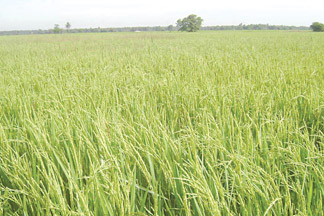
Paddy field |
Q: The agriculture sector is reported to have achieved
remarkable progress during the past few years. Could you elaborate?
A: The Census and Statistics Department’s reports Bear
testimony to the success in the agriculture sector. In 2010-1,062,117 ha
were brought under paddy cultivation and its harvest amounted to 2.92
million tonnes of rice as against 937,176 ha and MT 2.18 in 2005.
Agriculture Production
Other food crops such as maize, green gram, blackgreen, onion have
registered similar progress.
Q: Were there any challenges faced by your ministry?
A: Agriculture field is unstable since natural disasters such
as flood and drought destroy the harvest. Therefore the Ministry has
given priority for research and improvement of productivity.
|
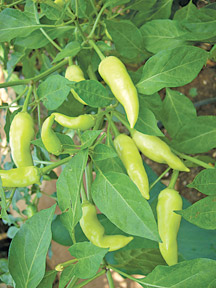
Vegetable cultivation |
Further researches have been conducted at the Bathalagoda. Paddy
Research institute to innovate on short-term paddy cultivations. They
have successfully introduced a new variety of short-term paddy - Bg 250
which can be harvested within a period of two and half months.
Innovation on rice-based products and improvement of productivity are
other important features. Steps to minimize the post harvest damage have
also been taken with further research being done.
Q: Rs. 700 million had been allocated to improve seed Farms by
the last budget. What is the progress?
A: Quality seeds are very important to improve the harvest.
All Government seed farms have been modernized. Paranthan and
Murukkan seed farms have been rehabilitated after decades of LTTE
terrorism. The aim of the government is to make the country
self-sufficient in rice and other subsidiary crops and fruits.
Q: High breed seeds and plants are imported for productive
cultivation. How do you hope to promote such cultivations?
A: The “seed Villages” program launched by the ministry has
been successful. Villagers in Dambulla and Matale had been selected to
make seeds and planting materials for potatoes, big onions and
vegetables. Training and assistance were also provided to these villages
by the ministry.
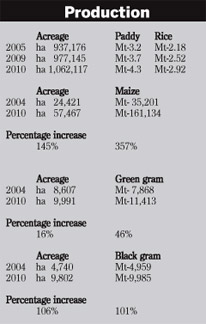 Q: There is a worldwide threat of food shortage. Even today
when people in some parts of the world are dying of starvation, Sri
Lanka is fortunate that it has not faced such tragedies. Your comment? Q: There is a worldwide threat of food shortage. Even today
when people in some parts of the world are dying of starvation, Sri
Lanka is fortunate that it has not faced such tragedies. Your comment?
A: “Api Vavamu - Rata Nagamu” food cultivation program which
was launched in 2007 - has produced beneficial results. People were
motivated to engage in cultivation. The neglected paddy fields were
brought under cultivation a fresh and given new life.
“Divi Naguma” Economic Development Program launched by Economic
Development Minister Basil Rajapaksa has set up one million home gardens
which has its impact on the fruit and vegetable cultivations.
The Agriculture component of the “Divi Naguma” program is implemented
by the Agriculture Ministry.
Present low price of the vegetables and fruits are due to be launched
at the “Divi Naguma” program.
Q: Sri Lanka spends a sizeable foreign exchange to import
fruits such as apples, grapes and oranges. What are your comments?
A: Cultivation of banana, papaw, local oranges, guava and
other varieties of local fruits were encouraged by “Api Vavamu - Rata
Nagamu” and “Divi Naguma” programs. They are now available at reasonable
prices in the local market. People should be motivated to consume local
items than the imported items.
Apples are chemically treated before exporting and it remains in
containers for a long period before reaching the local market. The
bitter truth is that there is no nutritious value in those fruits.
Q: One of the major inputs for the increase of paddy
production is the fertilizer subsidy. Could you comment on the
government’s plans for providing fertilizer on subsidised prices to the
farmers?
A: Rs.30,000 million was spent for the paddy fertilizer
subsidy last year. The fertilizer subsidy provides a big relief to paddy
farmers. The Government extended the fertilizer subsidy to all crops
recently. Now the fertilizer subsidy costs the State coffers more than
Rs.5,000 billion a year. A 50 kg bag of fertilizer for paddy is Rs.350
while the price of a 50 kg bag of other fertilizer is Rs.1,100 and
Rs.1,200.
The Government wants people to use this facility properly without
wasting.
Q: What is the progress achieved by the compost fertilizer
project of the government?
A: Compost fertilizer is becoming popular among farmers very
often. Compost fertilizer suppliers cannot meet the demand of potato
cultivators. The compost fertilizer centre at Pannala provides training
and conducts practical programs for farmers. Agriculture ministry aims
to reduce chemical fertilizer import by 25 percent within three years.
|

